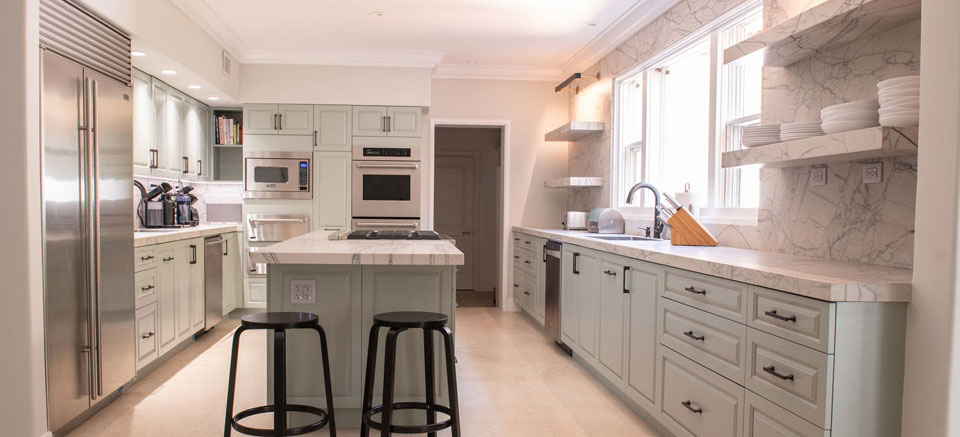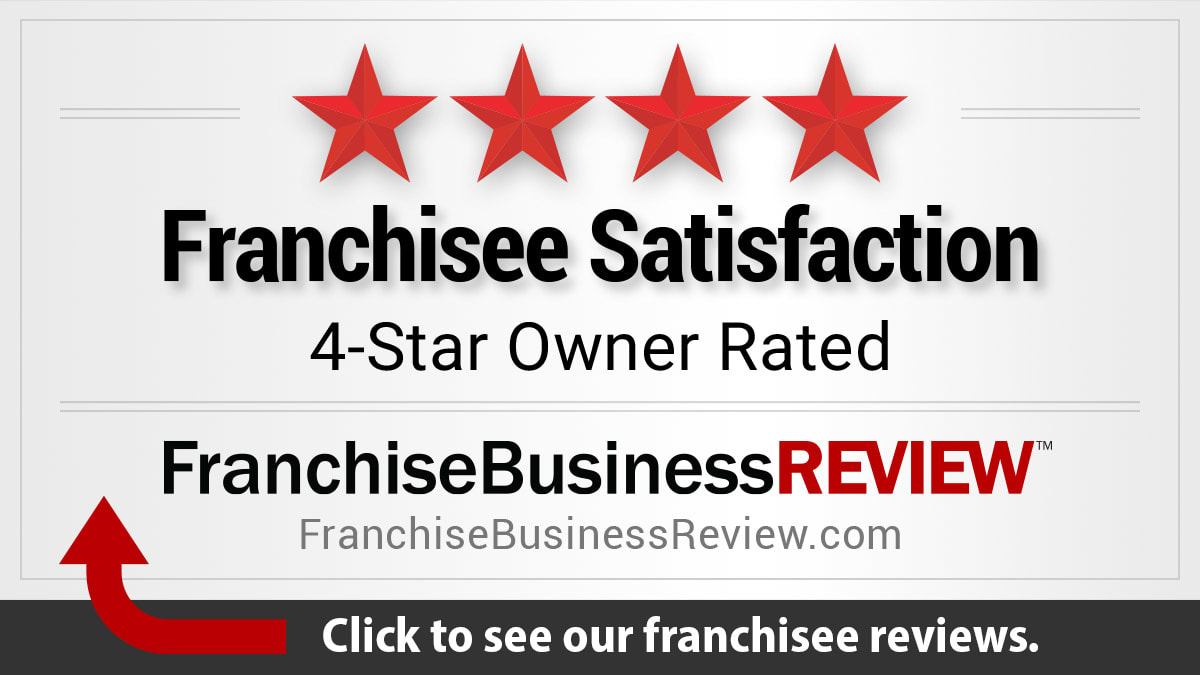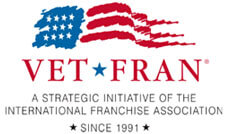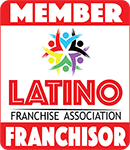Kitchen Solvers Franchise Review: Dechert Sharpell of Kansas City
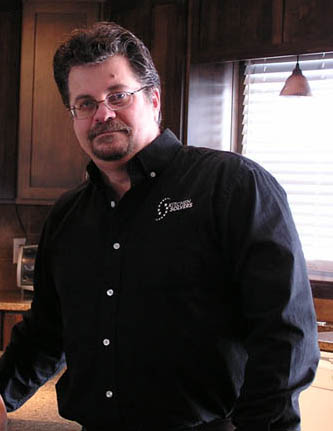
Dechert Sharpell shares his ideas on becoming a successful entrepreneur
Dechert Sharpell, 50, came to Kitchen Solvers after a 24-year career with Ferro Corporation, a chemical manufacturing company. Sharpell built laboratories for Ferro, and his attention to detail translated well into kitchen remodeling. He bought his Kitchen Solvers franchise in July 2008.
Dechert Sharpell of Kitchen Solvers of Kansas City.
What were you doing before Kitchen Solvers?
I had a 24-year career with Ferro Corporation. After 24 years, I was done. I felt like I had a bull’s-eye on my back. I started off as a lab tech, then ran inorganic manufacturing, then organic manufacturing, then health and safety. I eventually became a facilities manager, but also ran manufacturing. When emergencies arose, they could pull me in to handle anything — but I was also an Engineer Level 3, and my pay grade made my position vulnerable to cost cutting efforts because of the temptation to try to hire a college graduate to replace me. I worked there from 1979 to 2003. After I left Ferro, I went to northern Arizona to get into livestock. Then I got into house remodeling until the Arizona real estate market dried up. The whole time we were working on remodeling, we really wanted a foundation business — something that pays the bills. Now we are in Kansas City, and Kitchen Solvers is our foundation business. Kitchens Solvers was the first franchise that I looked at, and the one I came here for.
How did you find out about Kitchen Solvers?
I was searching for franchises and other businesses opportunities. Kitchen remodeling was something that I understood. At Ferro, as facilities manager, I built laboratories. Kitchen remodeling is easier than building a laboratory. I looked at three different refacers, and I looked at all sorts of franchises and existing businesses. I was heavily courted by Meinke, and I looked at a butcher shop. I didn’t want to have to upsell to customers — it just goes against my basic business philosophy. I thought Kitchen Solvers was the classiest operation.
What was your goal as you looked for a business?
I didn’t want to buy a job — I wanted to buy a business. There tend to be three types of business owners: the tech, the manager and the entrepreneur. I had already been a technician and managing. I wanted to be the entrepreneur and run the business, which is about thinking big and executing a vision. You want to make sure that the process runs well with you just overseeing and pulling strings. A perfect example is McDonald’s. Anybody can make money: You just follow their rules step by step by step. You’re not going to make money as the technician, no matter how skilled you are, because you’re going to get to the point where there’s too much work and you can’t do any more in order to make more money. If you try to grow your business as a technician, it will either perish, quality will suffer or it will contract. The goal is to work on your business, not in it.
How long have you been a franchisee?
I started in July 2008. I went to Kansas City because it has a nice steady economy. My wife and I aren’t afraid to move. She’s holding down the corporate job as an HR director for Comcast in Kansas City. One of my weak points is that I’m a corporate guy, and I’m not used to dealing with customers as much. That’s why I have salespeople. I have two subcontracted installers and one full-time employee who gets all the funky stuff done — all the stuff that isn’t cut and dried. I have two subcontracted design consultants/customer service reps. They carry the customer from the initial sales call all the way to the end except for the construction.
When I was doing it all myself, I would have a hard time saying no to customers, and that’s how you lose money. If I’m not so attached with the customer, I can think with my head and not my heart. I figure out ways to make them happy but without giving away the farm. Before a customer signs a contract, if you’re about to spend $14,000, I list everything you’re getting and everything you’re not getting. That way, when they ask for something that’s not part of the contract, I’m able to go to the subcontractor and say, “This is what we can do.”
What sets Kitchen Solvers apart?
The quality of my work is way above what’s offered by my competition. I’ve been told that not just by my customers but by my salespeople who have worked for me and have worked for others. I have done more than 75 remodels. My threshold for defects is extremely low. I try to make a reface not look like a reface, and I keep my prices competitive or to the lower end of the range. I use WalzCraft materials, which others cannot use because they can’t afford it. We’re very easy to work with. Eight o’clock means 8 o’clock — my people will be on time. I won’t stand for any of my people being unprofessional. I stay in touch with my employees throughout the day. If there’s a problem, the installer can always go outside and call me. We’re always taking care of the customer. I don’t try to impress with speed, but with total quality. I run my business a little bit more like I’m still a facilities manager and you’re the lab manager down the hall. I act like I’m going to be working for you again and again. Also, we never use a hard sell.
Once nice thing is we can get some products for less money thanks to Kitchen Solvers. I think if we focus on our main vendors, I think we can increase our buying power. If you and 80 people go into WalzCraft, they give you discounts — and we get some great discounts.
The folks in La Crosse are great, too. Whenever I need something, I just pick up the phone. “Hey, I need this testimonial put on my website.” They get it done. They work for me. I pay them a royalty and they provide me a service. They’re happy to help you. In fact, they wonder why more people don’t ask for help. I wound up fifth in nation in sales and had 153 percent revenue growth last year and I think a lot of it is because I asked for help. Gerry and Bill — they’ve just been a lot of help. Trey, too — they’re there as a resource. “Hey, Bill, I need a sales sheet for this home show coming up. I want to offer a bathroom vanity with a kitchen remodel.” Boom, it’s done. “Hey, Trey, I need a program loaded onto another computer.” He does it. Gerry is great, with his platinum sales training and the ongoing coaching we get from that. Say I have a challenge with a client in terms of trying to close a sale — I call Gerry and we talk about it. I’m constantly in touch with them on this stuff. They’re a heck of a resource.
Who makes a good Kitchen Solvers franchisee?
I think you have to have a good business sense. You have to be part of the system and realize that there’s a lot that corporate offers you — you just have to ask for it. You have to follow the system whenever you can. You also have to understand what a margin is and that you can’t charge too little. I think Kitchen Solvers would be a good move for a lot of corporate people who have been downsized and who have some mechanical aptitude.
If I was Kitchen Solvers, I would go after middle management or upper management people who have mechanical ability. You do not have to be in construction. If you are willing to lean on corporate for the help that they gladly offer, then I think management skills trump physical skills. If you know how to run a business and give are willing to give up that technician role, you can have success like you’ll not believe.
I think it’s actually helpful to own a business that’s outside your field because otherwise you’ll have a hard time giving up that technician role. My guys, I wind them up and let them go.
Who are your main customers? Who are your best customers?
I’m finding it varies. I’m starting to see people in their 30s. There are a lot of people looking to get their house updated one last time before retirement. I Zillow every house before we go so we know what we’re getting into. I try to be careful if I’m going into a $90,000 home — I give them a ballpark estimate and try to give them a gracious exit if they need one. Then I give them some neat advice on how to get something nice for less — I explain the shortcomings, but I try to give them a gracious exit. I make most of my sales in houses in the $175,000 to $300,000 range. The $300,000-plus customer is really into the quality of WalzCraft. We try to avoid Kmart shoppers, where price is everything. Right now, Bridgewood has come up with a value line of cabinetry, designed to compete with imported assemble-it-yourself cabinets. We carry things that are made in America, that are good quality, and that come from companies that are responsive to clients’ needs. If you buy a cheap Chinese cabinet, there’s no guarantee that you’ll be able to get a part if you need it in a couple of years. That’s not an issue with our suppliers. Our clients want quality over price. If price is everything — go to somebody else. If you’re happy with cheap imported cabinets, go look at them.
We’re not the cheap, low-budget, Ikea version of this. We offer Bridgewood — which doesn’t cost much more than Chinese cabinets and employs Americans.
How long do most jobs take?
I’d say six to seven working days. We tend to get some bigger jobs here. I’d say our average ticket is around $10,000. We just had a couple that spent around $23,000, and I’ve had a few than were $43,000. When I engineer a kitchen, I always ive customers as much as I can. I want it to look beautiful. We’re going to do what makes it right, not what makes it cheapest.
Where do you get most of your business?
Home shows and the internet are where I get most of my leads. I get to four or five home shows a year and 60 percent of my leads come from there. I pass out a lot of fliers. I don’t ignore the small events, either. I’ve had a lot of success at a little one called the Liberty Fall Festival. A booth costs $250, and I routinely pull $75,000 a year out of there. I may get eight leads, but I bet I close six. It’s a captive audience, and since it’s not as crowded of an event, we’re able to have a good conversation and I can show them everything. I’ve heard of one franchise that sets up at NASCAR events. What do you think the wives are doing when their husbands are in the pits?
What does your typical day look like?
I’m talking to my guys in the morning, getting them ready for jobs, engineering jobs and getting bids ready. Sometimes I’m fighting fires and trying to identify the fires that I’m fighting so I don’t have to fight that type of fire again. I try to trap problems and prevent them from flaring up — which I think is a skill that middle management experience brings in. How are we going to not step in that pile of goo again?
What does franchise ownership allow you to do that you couldn’t before?
Right now, the economy has you working your tail off. When lead flow is good, you can do whatever you want. The quicker you can get your business to run itself so you just direct it, the better you are. You don’t have to be there every day. I have that now with installation — the guys I work with are almost exclusively installers for Kitchen Solvers. I have the same guys over and over, so I don’t have to be onsite to supervise. With sales people, you can see what hole I’m trying to fill there. The next hole will be engineering — the actual design of the kitchen and ordering of materials. Once I get that taken care of, the business will more or less run itself and I can worry about growing the business, finding extra space, thinking more about marketing — that kind of stuff. My ultimate goal is to be able to have a fleet of businesses and be able to live off of them as retirement because you can direct a company well into your 80s.
Would you recommend a Kitchen Solvers franchise to someone else?
This is a fantastic franchise for someone who got downsized from a corporation. They should not shy away from it because they’re not a contractor. If you can build your own deck, you can run a Kitchen Solvers. We have a lot of ladies in our system. You’ll be fine. The stronger your background in a larger company or in management, the higher your success is going to be.
Someone who is already in the construction business has a leg up because they can add Kitchen Solvers to their portfolio, but there are a lot of guys out there sitting on a 401(k) who could use it to buy a franchise. There are people with MBAs who got downsized and they just don’t know that this is something they can do. You can grow it, get the processes down, staff it, sell it and make your money back.
Back
